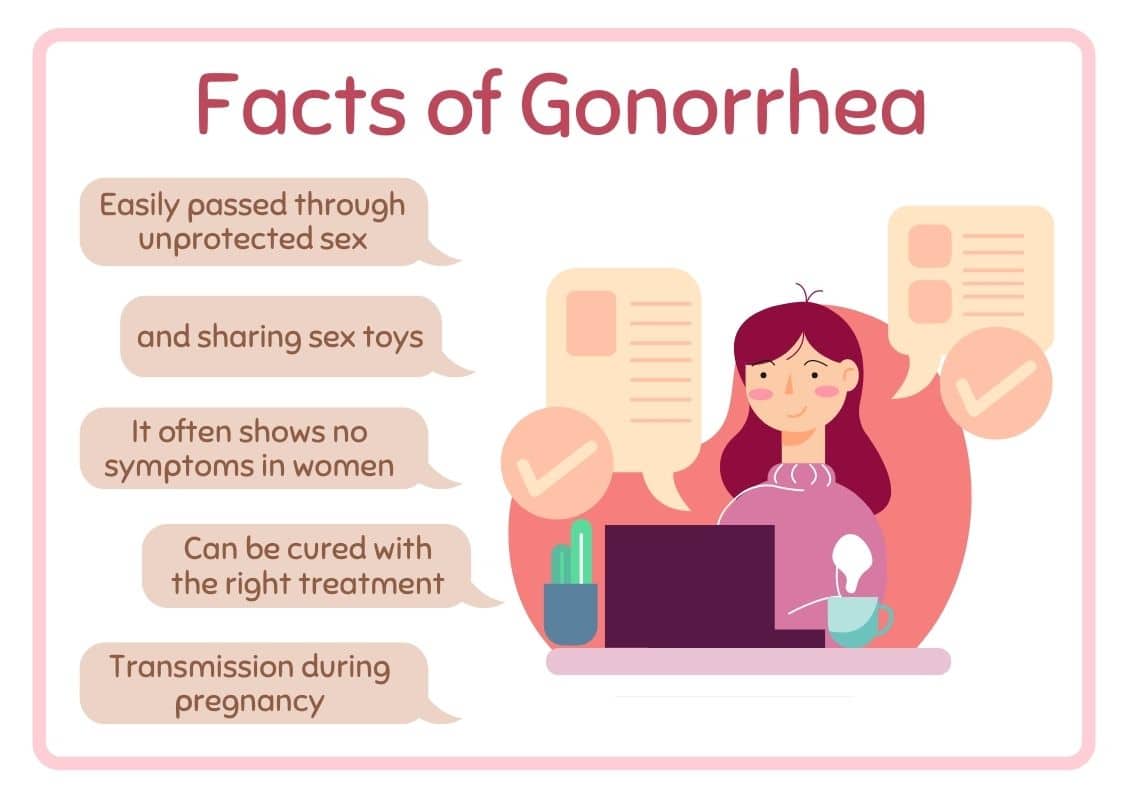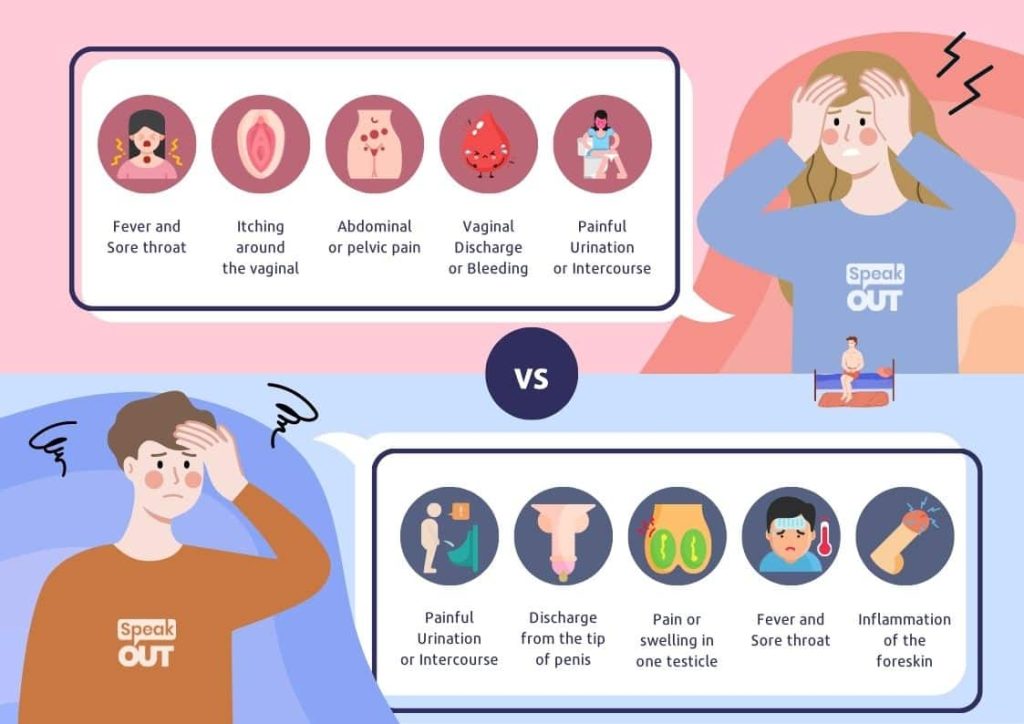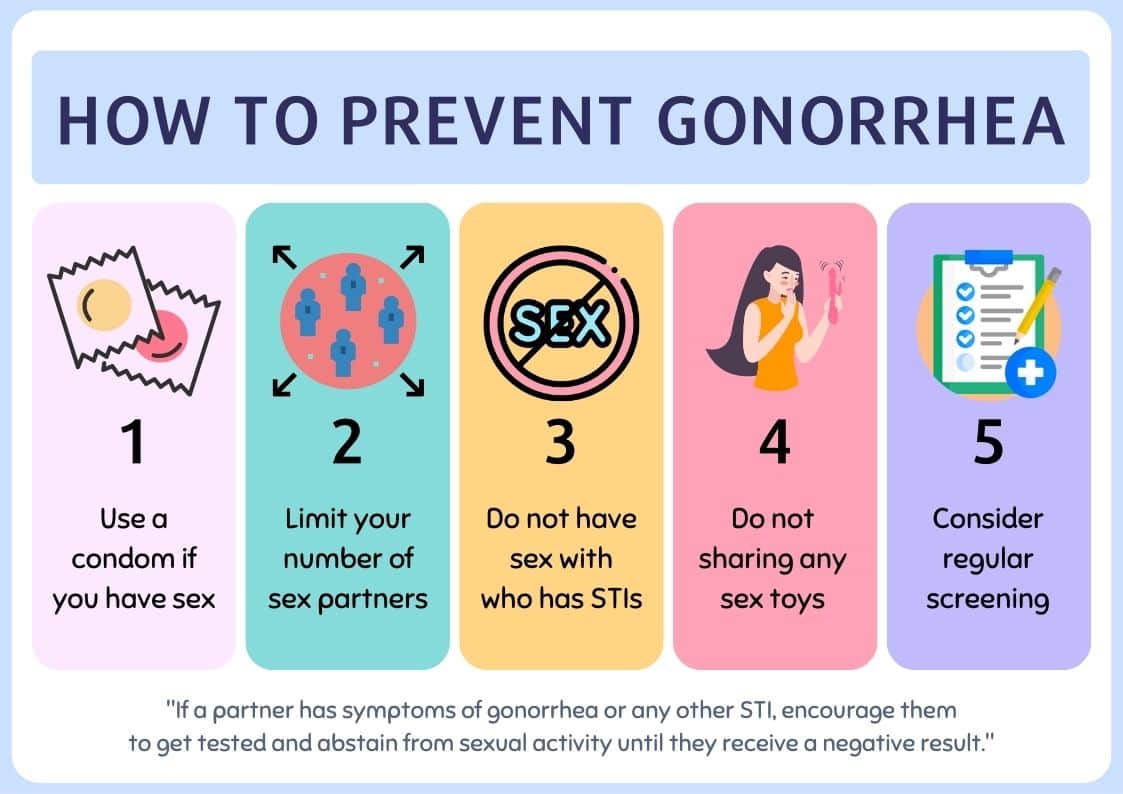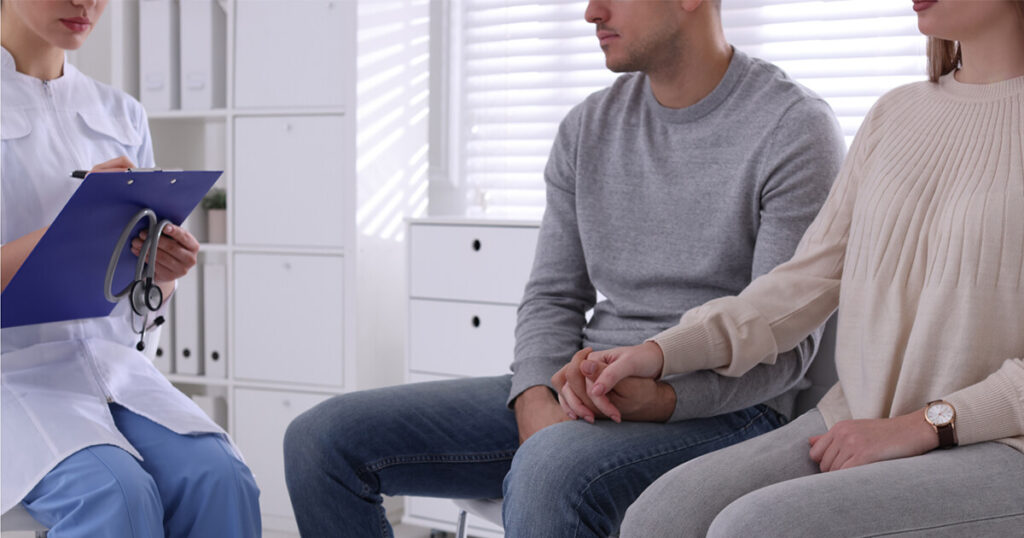Gonorrhea is a sexually transmitted disease (STD). and an infection caused by a sexually transmitted bacterium that infects both males and females. You get it from having sex with someone who is infected with it. You may have heard people call it “the clap.” Both men and women can get it, though men get it more often than women.
List of Contents
3. How can I reduce my risk of getting gonorrhea?
5. What are the signs and symptoms of Gonorrhea?
6. Gonorrhea affecting the genital tract
8. When should I test for Gonorrhea?
9. How Is Gonorrhea Diagnosed?
9.1 Gonorrhea is diagnosed using a lab test
11.1 I’m pregnant. How does gonorrhea affect my baby?
11.2 When can I have sex again after my gonorrhea treatment?
Gonorrhea most often affects the urethra, rectum or throat.
In females, gonorrhea can also infect the cervix.
What causes Gonorrhea?
Gonorrhea is caused by the bacterium Neisseria gonorrhoeae.
This common STI tends to target warm, moist areas of the body, including the:
- Urethra, or tube that drains urine from the bladder
- Eyes
- Throat
- Vagina
- Anus
female reproductive tract, which includes the fallopian tubes, cervix, and uterus neisseria gonorrhoeae infection can affect people of any age or gender, but it’s particularly commonTrusted Source among teens and young adults between the ages of 15 and 24.
Untreated neisseria gonorrhoeae infection can lead to long-term health concerns and, in some cases, infertility. But treatment with antibiotics can cure the infection and help lower your chances of experiencing health complications
How is Gonorrhea spread?

The bacteria that cause gonorrhoea are mainly found in discharge from the penis and in vaginal fluid.
Gonorrhoea is easily passed between people through:
- Unprotected vaginal, oral or anal sex
- Sharing vibrators or other sex toys that have not been washed or covered with a new condom each time they’re used
- The bacteria can infect the entrance to the womb (cervix), the tube that passes urine out of the body (urethra), the rectum and, less commonly, the throat or eyes.
- The infection can also be passed from a pregnant woman to her baby. If you’re pregnant and may have gonorrhoea, it’s important to get tested and treated before your baby is born.
- Without treatment, gonorrhoea can cause permanent blindness in a newborn baby.
- Gonorrhoea is not spread by kissing, hugging, swimming pools, toilet seats or sharing baths, towels, cups, plates or cutlery. The bacteria cannot survive outside the human body for long.
How can I reduce my risk of getting gonorrhea?
The only way to completely avoid STDs is to not have vaginal, anal, or oral sex. If you are sexually active, the following things can lower your chances of getting gonorrhea:
- Being in a long-term mutually monogamous relationship with a partner who has been tested and does not have this infection.
- Using condoms the right way every time you have sex.
Gonorrhea Risk Factors
- Sexually active people can get gonorrhea through vaginal, anal, or oral sex without a condom with a partner who has gonorrhea.
- Having a new sex partner
- Having a sex partner who has other partners
- Having more than one sex partner
- Have had gonorrhea before
- Have had other STDs
What are the signs and symptoms of Gonorrhea?
In many cases, this infection causes no symptoms. Symptoms, however, can affect many sites in your body, but commonly appear in the genital tract.
Gonorrhea affecting the genital tract
Signs and symptoms of gonorrhea infection in men include:
- Pain and burning while peeing
- Pus-like discharge from the tip of the penis
- Pain or swelling in one testicle
- Inflammation or swelling of the foreskin
- Sore throat
Signs and symptoms of Neisseria gonorrhoeae infection in women include:
- Increased vaginal discharge and Strong-smelling vaginal discharge
- Pain and burning while peeing
- Vaginal bleeding between periods, such as after vaginal intercourse
- Abdominal or pelvic pain
- Peeing more often than usual
- Sore throat
- Fever and severe lower abdominal pain, if the infection has spread to the fallopian tubes and stomach area
Rectal symptoms may also occur if a person has anal sex. These may include:
- Discharge
- Itching around the anus
- Soreness
- Bleeding
- Pain during bowel movements
Gonorrhea can also affect these parts of the body:
Rectum
Signs and symptoms include anal itching, pus-like discharge from the rectum, spots of bright red blood on toilet tissue and having to strain during bowel movements.
Eyes
This infection that affects your eyes can cause eye pain, sensitivity to light, and pus-like discharge from one or both eyes.
Throat
Signs and symptoms of a throat infection might include a sore throat and swollen lymph nodes in the neck.
Joints
If one or more joints become infected by bacteria (septic arthritis), the affected joints might be warm, red, swollen and extremely painful, especially during movement.
Complications
Untreated neisseria gonorrhoeae infection can lead to major complications, such as:
- Infertility in women. Gonorrhea can spread into the uterus and fallopian tubes, causing pelvic inflammatory disease (PID). PID can result in scarring of the tubes, greater risk of pregnancy complications and infertility. PID requires immediate treatment.
- Infertility in men. Gonorrhea can cause a small, coiled tube in the rear portion of the testicles where the sperm ducts are located (epididymis) to become inflamed (epididymitis). Untreated epididymitis can lead to infertility.
- Infection that spreads to the joints and other areas of your body. The bacterium that causes gonorrhea can spread through the bloodstream and infect other parts of your body, including your joints. Fever, rash, skin sores, joint pain, swelling and stiffness are possible results.
- Increased risk of HIV/AIDS. Having gonorrhea makes you more susceptible to infection with human immunodeficiency virus (HIV), the virus that leads to AIDS. People who have both gonorrhea and HIV are able to pass both diseases more readily to their partners.
- Complications in babies. Babies who contract gonorrhea from their mothers during birth can develop blindness, sores on the scalp and infections.

When should I test for Gonorrhea?
Make an appointment with your doctor if you notice any troubling signs or symptoms, such as a burning sensation when you urinate or a pus-like discharge from your penis, vagina or rectum.
Also make an appointment with your doctor if your partner has been diagnosed with this infection. You may not experience signs or symptoms that prompt you to seek medical attention. But without treatment, you can reinfect your partner even after he or she has been treated for neisseria gonorrhoeae infection.
How Is Gonorrhea Diagnosed?
A person might receive a diagnosis of neisseria gonorrhoeae infection if they see a doctor because they have had symptoms or because they suspect that they have been exposed to the infection. The doctor will ask the person about their symptoms and medical history. They will also order a test, which might require a urine sample or a swab of the penis, cervix, urethra, anus, or throat.
Gonorrhea is diagnosed using a lab test
that requires either a urine sample or a swab taken from the urethra (for men) or the cervix or vagina (for women). If a person has had anal or oral sex, and a rectal or pharyngeal infection is suspected, a swab specimen may be collected from the throat or the rectum for testing right up arrow.
The recommended method for gonorrhea testing is the nucleic acid amplification test, which detects the genetic material of Neisseria gonorrhoeae in the urine or swab sample provided. In a second type of lab test, called a culture, the sample is placed in a container to see whether gonorrhea bacteria grow over several days.
If you think you may have neisseria gonorrhoeae infection, make an appointment to see your healthcare provider. Healthcare providers at public health or STD clinics and Planned Parenthood can also perform gonorrhea tests.
Since a person may have this infection without displaying symptoms, regular testing can help to detect the disease before it causes complications. This is particularly important for people who are at increased risk of contracting the disease,
Recommends that the following groups of people get tested for gonorrhea regularly:
- Sexually active women under 25 should be tested once yearly.
- Sexually active women over 25 who are at increased risk should be tested once yearly.
- All pregnant women under 25 should be tested early in their pregnancy, as should pregnant women over 25 if they are at increased risk.
- Men who have sex with men should be tested at least once yearly, regardless of condom use.
- Men who have sex with men and are at increased risk should get tested every three to six months.
- People living with HIV should be tested for gonorrhea at their first HIV evaluation, and subsequently at least once yearly.
- People with HIV who are at increased risk for gonorrhea should be screened more than once yearly (depending on individual risk behaviors and the local epidemiology)
How is Gonorrhea treated?
Modern antibiotics can cure gonorrhea, in most cases.
You can’t treat gonorrhea with over the counter or home remedies. If you think you could have gonorrhea, or a sexual partner receives a positive test result, you’ll need to get a diagnosis and treatment from a healthcare professional.
Antibiotics
The recommended treatmentTrusted Source for gonorrhea is a one-time intramuscular injection of the antibiotic ceftriaxone. Typically, you’ll get this shot in the buttocks. A healthcare professional will likely also prescribe an oral medication, such as:
- A single dose of azithromycin
- A twice-daily dose of doxycycline for 7 daysTrusted Source
- After taking these antibiotics, you should begin to feel relief from any symptoms within days – but you’ll need to wait a full week after finishing your medications before participating in any sexual activity.
For oral gonorrhea, you’ll need to follow up with a healthcare professional 1 to 2 weeks laterTrusted Source to make sure the infection has cleared.
Can gonorrhea be cured?
Antibiotics can cure gonorrhea. Still, the emergence of antibiotic-resistant strains of gonorrheaTrusted Source poses some challenges for successful treatment.
That’s why you’ll generally receive both an injection and oral dose of antibiotics. If the first treatment approach doesn’t work, a healthcare professional will prescribe another antibiotic, which you’ll take once or twice a day for 7 days.
It’s important to take all of your medication to completely treat the infection, even if your symptoms go away before you finish your prescription.
If you continue to have symptoms after taking your antibiotics as prescribed, contact a healthcare professional as soon as possible so they can try a different treatment.
I’m pregnant. How does gonorrhea affect my baby?
If you are pregnant and have gonorrhea, you can give the infection to your baby during delivery. This can cause serious health problems for your baby. If you are pregnant, talk to your healthcare provider so you get the correct examination, testing, and treatment, as necessary. Treating gonorrhea as soon as possible will make health problems for your baby less likely.
When can I have sex again after my gonorrhea treatment?
Wait seven days after finishing all medicine before having sex. You and your sex partner(s) should avoid having sex until you have each completed treatment and your symptoms are gone. This will help prevent you and your partner(s) from giving or getting gonorrhea again. Those with gonorrhea should be retested about three months after treatment of an initial infection, even if their partners received successful treatment.
If you’ve had gonorrhea and took medicine in the past, you can still get it again. This happens if you have sex without a condom with a person who has gonorrhea.
What happens if I don’t receive treatment?
Untreated gonorrhea can cause serious and permanent health problems. In women, untreated gonorrhea can cause pelvic inflammatory disease (PID). Some of the complications of PID are:
- Formation of scar tissue that blocks fallopian tubesexternal icon;
- Ectopic pregnancy (pregnancy outside the wombexternal icon);
- Infertility (not being able to get pregnant); and
- Long-term pelvic/abdominal pain.
In men, gonorrhea can cause a painful condition in the tubes attached to the testicles, which can, in rare cases, lead to infertility. Rarely, untreated gonorrhea can also spread to your blood or joints. This condition can be life-threatening. Untreated gonorrhea may also increase your chances of getting or giving HIV.

How to prevent Gonorrhea
To reduce your gonorrhea risk:
- Use a condom if you have sex. Abstaining from sex is the surest way to prevent gonorrhea. But if you choose to have sex, use a condom during any type of sexual contact, including anal sex, oral sex or vaginal sex.
- Limit your number of sex partners. Being in a monogamous relationship in which neither partner has sex with anyone else can lower your risk.
- Be sure you and your partner are tested for sexually transmitted infections. Before you have sex, get tested and share your results with each other.
- Don’t have sex with someone who appears to have a sexually transmitted infection. If your partner has signs or symptoms of a sexually transmitted infection, such as burning during urination or a genital rash or sore, don’t have sex with that person.
- Consider regular neisseria gonorrhoeae infection screening. Annual screening is recommended for sexually active women younger than 25 and for older women at increased risk of infection. This includes women who have a new sex partner, more than one sex partner, a sex partner with other partners, or a sex partner who has a sexually transmitted infection.
Regular screening is also recommended for men who have sex with men, as well as their partners. To avoid getting neisseria gonorrhoeae infection again, abstain from sex until after you and your sex partner have completed treatment and after symptoms are gone.
References
Gonorrhea – CDC Fact Sheet
- cdc.gov/std/gonorrhea/stdfact-gonorrhea.htm
Gonorrhea
- mayoclinic.org/diseases-conditions/gonorrhea/symptoms-causes/syc-20351774
Everything You Need to Know About Gonorrhea
- healthline.com/health/gonorrhea
Gonorrhea
- webmd.com/sexual-conditions/gonorrhea#1
What Is Gonorrhea? Symptoms, Causes, Diagnosis, Treatment, and Prevention
- everydayhealth.com/gonorrhea/guide/

